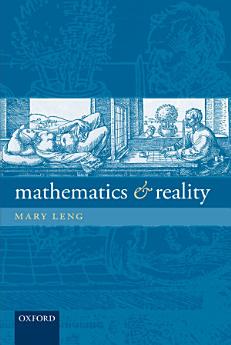Mathematics and Reality
Mary Leng
ມ.ສ. 2010 · OUP Oxford
ປຶ້ມອີບຸກ
288
ໜ້າ
family_home
ມີສິດ
info
reportບໍ່ໄດ້ຢັ້ງຢືນການຈັດອັນດັບ ແລະ ຄຳຕິຊົມ ສຶກສາເພີ່ມເຕີມ
ກ່ຽວກັບປຶ້ມ e-book ນີ້
Mary Leng offers a defense of mathematical fictionalism, according to which we have no reason to believe that there are any mathematical objects. Perhaps the most pressing challenge to mathematical fictionalism is the indispensability argument for the truth of our mathematical theories (and therefore for the existence of the mathematical objects posited by those theories). According to this argument, if we have reason to believe anything, we have reason to believe that the claims of our best empirical theories are (at least approximately) true. But since claims whose truth would require the existence of mathematical objects are indispensable in formulating our best empirical theories, it follows that we have good reason to believe in the mathematical objects posited by those mathematical theories used in empirical science, and therefore to believe that the mathematical theories utilized in empirical science are true. Previous responses to the indispensability argument have focussed on arguing that mathematical assumptions can be dispensed with in formulating our empirical theories. Leng, by contrast, offers an account of the role of mathematics in empirical science according to which the successful use of mathematics in formulating our empirical theories need not rely on the truth of the mathematics utilized.
ກ່ຽວກັບຜູ້ຂຽນ
Mary Leng is Lecturer in Philosophy at the University of York. She previously held a research fellowship at St John's College, Cambridge (2002-2006), and visiting fellowships at the University of California at Irvine (2001) and the Peter Wall Institute for Advanced Study at the University of British Columbia (2003). Her primary research interests are in the Philosophy of Mathematics and Logic, and the Philosophy of Science. She is the co-editor (with Alexander Paseau and Michael Potter) of Mathematical Knowledge (Oxford: OUP, 2007).
ໃຫ້ຄະແນນ e-book ນີ້
ບອກພວກເຮົາວ່າທ່ານຄິດແນວໃດ.
ອ່ານຂໍ້ມູນຂ່າວສານ
ສະມາດໂຟນ ແລະ ແທັບເລັດ
ຕິດຕັ້ງ ແອັບ Google Play Books ສຳລັບ Android ແລະ iPad/iPhone. ມັນຊິ້ງຂໍ້ມູນໂດຍອັດຕະໂນມັດກັບບັນຊີຂອງທ່ານ ແລະ ອະນຸຍາດໃຫ້ທ່ານອ່ານທາງອອນລາຍ ຫຼື ແບບອອບລາຍໄດ້ ບໍ່ວ່າທ່ານຈະຢູ່ໃສ.
ແລັບທັອບ ແລະ ຄອມພິວເຕີ
ທ່ານສາມາດຟັງປຶ້ມສຽງທີ່ຊື້ໃນ Google Play ໂດຍໃຊ້ໂປຣແກຣມທ່ອງເວັບຂອງຄອມພິວເຕີຂອງທ່ານໄດ້.
eReaders ແລະອຸປະກອນອື່ນໆ
ເພື່ອອ່ານໃນອຸປະກອນ e-ink ເຊັ່ນ: Kobo eReader, ທ່ານຈຳເປັນຕ້ອງດາວໂຫຼດໄຟລ໌ ແລະ ໂອນຍ້າຍມັນໄປໃສ່ອຸປະກອນຂອງທ່ານກ່ອນ. ປະຕິບັດຕາມຄຳແນະນຳລະອຽດຂອງ ສູນຊ່ວຍເຫຼືອ ເພື່ອໂອນຍ້າຍໄຟລ໌ໄໃສ່ eReader ທີ່ຮອງຮັບ.




